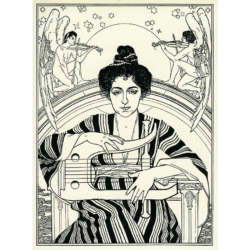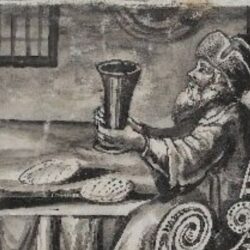| Source (Hebrew) | Translation (English) |
|---|---|
אָשִׁיר לָאֵל אֲשֶׁר שָׁבַת מִמְּלַאכְתּוֹ בְּיוֹם שַׁבָּת נְתָנוֹ לְעַם כְּבָבַת עַיִן תָּמִיד יִנְצְרֶנְהוּ |
I will sing to El who rested from all work on the day of Shabbat And gave it to a nation who Will always be guarded like the pupil of the eye |
מְכֻבָּד הוּא מִכָּל יָמִים כִּי בוֹ שָׁבַת צוּר עוֹלָמִים יָנוּחַ בּוֹ לֵב עֲגוּמִים שַׂמֵּחַ יְשַׂמְּחֶנְהוּ |
More honored than any other day Because on it the Rock of Ages rested The heart of the morose will rest on it And will surely be gladdened |
שַׁבַּת קֹדֶשׁ יוֹם מְנוּחָה בּוֹ נָסוּ יָגוֹן וַאֲנָחָה עַם אֵל בְּהַשְׁקֵט וּבְבִטְחָה שַׁבָּת עֹנֶג יִקְרָאוּהוּ |
The holy Shabbat is a day of rest On it suffering and sighing will flee The nation of El in relaxation and security Will call Shabbat “enjoyment” |
הָאֵל אֲשֶׁר בָּחַר בָּנוּ שַׁבַּת קָדְשׁוֹ הִנְחִילָנוּ מִן הָעַמִּים הִבְדִּילָנוּ לִהְיוֹת לָנוּ לֵאלֹהִים הוּא |
El who has chosen us Granted us His holy Shabbat And separated us from the nations To be our God |
הַלְוִיִּם רִנָּה יִפְצְחוּ לִכְבוֹד שַׁבָּת כִּי בוֹ נָחוּ כָּל יִשְׂרָאֵל בּוֹ יִשְׂמָחוּ שִׂמְחַת עוֹלָם עַל רֹאשָׁם הוּא |
The Levites sing with joy In honor of Shabbat because they rest on it All of Yisra’el will be happy on it An everlasting happiness it crowns their heads |
חָזָק יִשְׁלַח מְשִׁיחֵנוּ וְיָשִׁיב אֶת שְׁבִיתֵנוּ וְאָז נִשְׁבּוֹת שַׁבָּתֵּנוּ עוֹלָם שֶׁכֻּלּוֹ שַׁבָּת הוּא |
The Strong One will send our Mashiaḥ And will bring back our captives Then we will celebrate every Shabbat In a world that is always Shabbat |
“Ashir la-El Asher Shavat” was composed by Moshe haLevi (c.1827-1910), chief rabbi of the Ottoman Empire in the late 19th and early 20th century. The English translation here by Honi Sanders was published in the birkon for his wedding, Siman l’Vanim (Dimus Parrhesia Press 2019). –Aharon Varady
Source(s)


“אָשִׁיר לָאֵל אֲשֶׁר שָׁבַת | Ashir la-El Asher Shavat, a piyyut by Rabbi Mosheh ha-Levi (ca. 19th c.)” is shared through the Open Siddur Project with a Creative Commons Attribution-ShareAlike 4.0 International copyleft license.









Leave a Reply